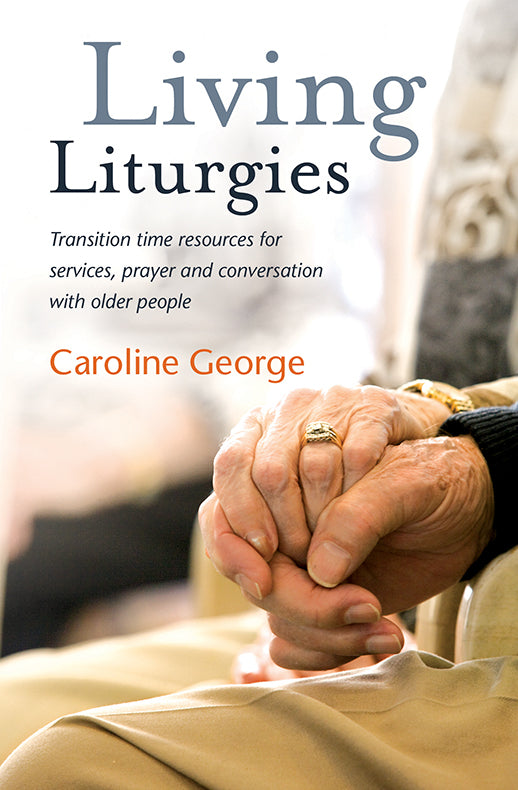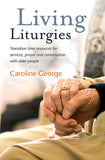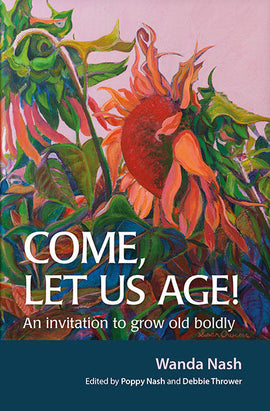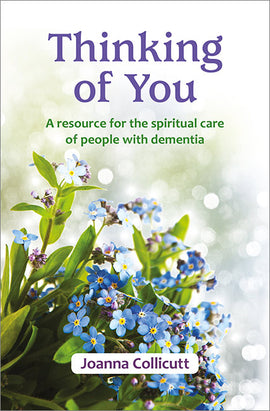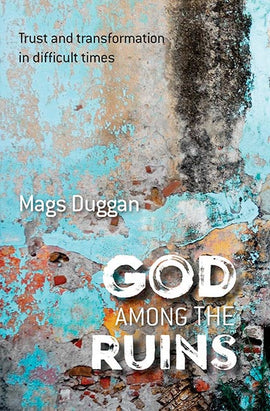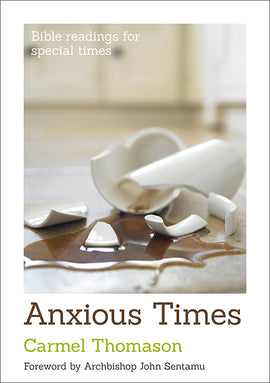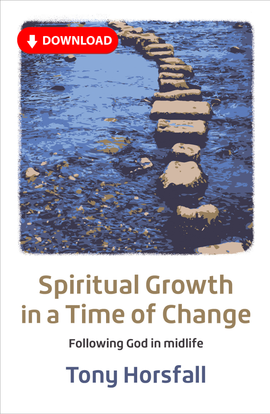Living Liturgies: Transition time resources for services, prayer and conversation with older people
A creative and original book of liturgies and reflections for use in worship and also pastoral ministry with older people, who are moving from the 'third age' to the more dependent 'fourth age' of life. Developed by the author after many years of working in church and community settings with older people, the book provides an invaluable resource for those embarking on this ministry as well as those wanting inspiration for their ongoing work. The book also includes wider reflections on ageing and spirituality.
| Title | Living Liturgies: Transition time resources for services, prayer and conversation with older people |
| Author | Caroline George |
| ISBN | |
| Description | A creative and original book of liturgies and reflections for use in worship and also pastoral ministry with older people, who are moving from the 'third age' to the more dependent 'fourth age' of life. Developed by the author after many years of working in church and community settings with older people, the book provides an invaluable resource for those embarking on this ministry as well as those wanting inspiration for their ongoing work. The book also includes wider reflections on ageing and spirituality. Caroline George writes: Worship resources to use with people in what we now know as the fourth stage of life, the period where independence begins to move to dependence, require a different approach to regular worship resources. Caroline George introduces her new resource to help leaders meet this need.
It was just so when I agreed to lead worship for a group of older people who met at the St Peter's Women's Fellowship in Hall Green, Birmingham. I wrongly assumed resources would abound in local Christian bookshops and in desperation began rummaging around the corners of my mind and ruminating on words from secular and biblical contexts, familiar prayers, creative prayers and visual aids, and then weaving them together for worship. It was a process that began in desperation and ended with delight as thoughts developed in the quiet nooks and crannies of busy days. Living Liturgies evolved from my relationship with the Hall Green Fellowship where I had the privilege of leading their monthly devotional service for over ten years. When it became apparent that the group would close, there was a need to create services that were not just for their closing meetings but had the potential to be a prompt for prayer in the weeks and months ahead as the group members worshipped alone or in other places. Familiar features and furniture found in homes, hospital and hospice offered the foundation for themes that might easily be recalled and could cross boundaries from independent to dependent living. The services captured the imagination of the group, conversation rolled, laughter and tears were shared and worship was relevant and reverent. |
| Details |
|
A creative and original book of liturgies and reflections for use in worship and also pastoral ministry with older people, who are moving from the 'third age' to the more dependent 'fourth age' of life. Developed by the author after many years of working in church and community settings with older people, the book provides an invaluable resource for those embarking on this ministry as well as those wanting inspiration for their ongoing work. The book also includes wider reflections on ageing and spirituality.
Caroline George writes:
Worship resources to use with people in what we now know as the fourth stage of life, the period where independence begins to move to dependence, require a different approach to regular worship resources.
Caroline George introduces her new resource to help leaders meet this need.
It was just so when I agreed to lead worship for a group of older people who met at the St Peter's Women's Fellowship in Hall Green, Birmingham. I wrongly assumed resources would abound in local Christian bookshops and in desperation began rummaging around the corners of my mind and ruminating on words from secular and biblical contexts, familiar prayers, creative prayers and visual aids, and then weaving them together for worship. It was a process that began in desperation and ended with delight as thoughts developed in the quiet nooks and crannies of busy days. Living Liturgies evolved from my relationship with the Hall Green Fellowship where I had the privilege of leading their monthly devotional service for over ten years. When it became apparent that the group would close, there was a need to create services that were not just for their closing meetings but had the potential to be a prompt for prayer in the weeks and months ahead as the group members worshipped alone or in other places. Familiar features and furniture found in homes, hospital and hospice offered the foundation for themes that might easily be recalled and could cross boundaries from independent to dependent living. The services captured the imagination of the group, conversation rolled, laughter and tears were shared and worship was relevant and reverent.
Country Way - May 2016
In her helpful introduction, Caroline George makes the point that since the majority of older people do not have dementia there is a real need for 'carefully prepared worship for those whose bodies are frail but who wish to engage and participate in worshipping God'(p10). This book then goes on to provide examples of such worship.
We are reminded how the physical space can shape the worship and we are shown ways of using familiar traditional worship resources, as well as introducing new ideas. Each liturgy begins with something familiar and this is used to begin conversations, which then lead into and are part of worship.
There is nothing simplistic or patronising about these liturgies; Caroline is not afraid to confront the difficult issues. People who are moving from the activity of the third age to the dependence of the fourth are grappling with difficult issues and need support as they do so. Older people have just as diverse and complex spiritual needs as any other group and if we want to minister to this group and we need to take that seriously.
The liturgies are well described with helpful additional notes for those leading worship. Anyone who regularly leads worship for groups of older people either in church or in a residential setting will find this book invaluable.
Elizabeth Clark
Caroline George has spent many years creating times of worship which provide the opportunity for people to befriend the elderly stranger within themselves, while making sense of the changes happening to them as they begin to move from independence to dependence. Living Liturgies (BRF) is a collection of resources for services, prayer and conversation, honed for use especially for older people who are no longer able to attend Sunday worship. Her services contain familiar elements, in terms of prayers, language and hymns, but also more tactile or visual elements to enable groups in residential homes and church contexts to use a multisensory or reminiscence-based approach, in order to give voice to past, present and future and help provide people with the tools to find grace in the complexity of lives which may be growing ever more isolated or fragmented.
Richard Greatrex in Manna - Diocese of Bath and Wells Autumn 2015
Anyone in the Church who works with elderly people and leads their worship should have a copy of Caroline George's book on their shelves. Or rather, they should have it in their hands, to read, re-read and use. The Introduction contains much wisdom, and the liturgies that take up almost the whole of the rest of the book are excellent. They arose from Caroline's work with a particular women's fellowship over many years. She tells us she found the members an inspiring bunch, and that is clear from the book. There is nothing condescending or patronising about it. It is magnificently down-to-earth and full of God.
She speaks of 'bringing to God the ashes of our discomfort and pain, and the flames of our anxieties about ageing and dying,' and near the end of the book she poses an important question: 'I wonder how well we understand the dragons of fear for elderly people, and whether we create opportunities for them to name those fears.' Her little book suggests she herself understands those dragons pretty well, and her liturgies themselves offer plenty of examples where they are named. I was especially encouraged to see 'A service of lament; 'Anger and tears''. For years I have been quoting to anyone who will listen the devastating remark of the great Old Testament scholar, Walter Brueggemann, made in a paper published in 1986 called 'The Costly Loss of Lament', about how the church 'goes on singing 'happy songs' in the face of raw reality.' Despite what Caroline says about the church 'once again recognising the need to lament', I do not see many signs of it, but Living Liturgies is one of them. Alleluia!
One small complaint . . . about complaint . . . or rather, the lack of it. 'The psalmists,' writes George, 'give a wonderful insight into the process of anger and lament worked out in submission to God.' I find the psalmists more often hurling their anger and lament into God's face (such is their profound trust in his mercy) - and just think for a moment of Job! George's 'conversation starters' in her service of lament include some highly pertinent questions about people's anger. But what about their anger with God? That too needs to be named, and opportunities given for its guilt-free expression. But that is only a small complaint.
Caroline George has written a fine book, and given the church a great gift.
Review by Trevor Dennis

